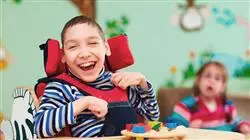University certificate
The world's largest faculty of physiotherapy”
Introduction to the Program
A comprehensive and practical Professional master’s degree that will allow you to learn everything you need to work as a physiotherapist in early care in a realistic and direct way”

Physiotherapy in early childhood is a form of treatment and care for children who present some type of alteration in their development, resulting in a motor deficiency of neuromuscular origin. In some cases, it can include respiratory rehabilitation in infants who have suffered from asthma, bronchiolitis, cystic fibrosis, and others. Furthermore, it seeks to improve the sequelae of some acute illnesses such as meningitis, cardiac deformities, respiratory infections, etc.
Based on the above, it is essential to have a program that encourages professionals to continue their studies in the field. As such, the Professional Master's Degree in Physiotherapy in Early Care delves into the most important aspects, providing in-depth knowledge through a program developed by experts in the field. The program stands out for dealing with topics ranging from the generality of the specialty, the normal development of children and the different pathologies that may occur and require physiotherapist care.
Currently, programs on physiotherapy in Early Childhood Care are scarce, which is why this program offers specific knowledge on that very discipline. Focusing on the latest evidence, it includes topics on telerehabilitation, therapeutic mobile activities, family-centered work and a unit that will discuss how to conduct literature searches on which to base physiotherapeutic interventions. This enables students to keep up to date and administer evidence-based treatments.
Moreover, childhood obesity is becoming a public health problem that worries many health professionals. In 2016, The World Health Organization estimated that about 41 million children under the age of five worldwide were already suffering from this condition. In many cases, most of these infants continue to be obese into adulthood. As a result, developing a new perspective to address this situation is critical. In this sense, the program adopts the perspective of experts in this area so that professionals can learn about the new available treatments in order to improve the mobility of children suffering from overweight or obesity.
Get up to date on all the latest developments in the field of physiotherapy by completing the most effective program on the subject"
This Professional master’s degree in Physiotherapy in Early Care offers the advantages of a high-level scientific, teaching, and technological program. These are some of its most notable features:
- The latest technology in online teaching software
- An intensely visual teaching system, supported by graphic and schematic contents, easy to assimilate and understand
- Practical cases presented by practicing experts
- State-of-the-art interactive video systems
- Teaching supported by telepractice
- Continuous updating and recycling systems
- Autonomous learning: full compatibility with other occupations
- Practical exercises for self-evaluation and learning verification
- Support groups and educational synergies: questions to the expert, debate and knowledge forums
- Communication with the teacher and individual reflection work
- Content that is available from any fixed or portable device with an Internet connection
- Supplementary documentation databases are permanently available, even after the program
With a methodological design based on proven teaching techniques, this program will take you through different teaching approaches to allow you to learn in a dynamic and effective way”
The program’s teaching staff includes professionals from the sector who contribute their work experience to this program, as well as renowned specialists from leading societies and prestigious universities.
The multimedia content, developed with the latest educational technology, will provide the professional with situated and contextual learning, i.e., a simulated environment that will provide immersive training programmed to learn in real situations.
This program is designed around Problem-Based Learning, whereby the professional must try to solve the different professional practice situations that arise during the academic year. For this purpose, the professional will be assisted by an innovative interactive video system created by renowned and experienced experts.
Our innovative telepractice concept will give you the opportunity to learn through an immersive experience, which will provide you with a faster integration and a much more realistic view of the contents: “Learning from an Expert”

A cutting-edge program created to propel you toward greater competitiveness in the job market"
Why study at TECH?
TECH is the world’s largest online university. With an impressive catalog of more than 14,000 university programs available in 11 languages, it is positioned as a leader in employability, with a 99% job placement rate. In addition, it relies on an enormous faculty of more than 6,000 professors of the highest international renown.

Study at the world's largest online university and guarantee your professional success. The future starts at TECH”
The world’s best online university according to FORBES
The prestigious Forbes magazine, specialized in business and finance, has highlighted TECH as “the world's best online university” This is what they have recently stated in an article in their digital edition in which they echo the success story of this institution, “thanks to the academic offer it provides, the selection of its teaching staff, and an innovative learning method aimed at educating the professionals of the future”
A revolutionary study method, a cutting-edge faculty and a practical focus: the key to TECH's success.
The most complete study plans on the university scene
TECH offers the most complete study plans on the university scene, with syllabuses that cover fundamental concepts and, at the same time, the main scientific advances in their specific scientific areas. In addition, these programs are continuously being updated to guarantee students the academic vanguard and the most in-demand professional skills. In this way, the university's qualifications provide its graduates with a significant advantage to propel their careers to success.
TECH offers the most comprehensive and intensive study plans on the current university scene.
A world-class teaching staff
TECH's teaching staff is made up of more than 6,000 professors with the highest international recognition. Professors, researchers and top executives of multinational companies, including Isaiah Covington, performance coach of the Boston Celtics; Magda Romanska, principal investigator at Harvard MetaLAB; Ignacio Wistumba, chairman of the department of translational molecular pathology at MD Anderson Cancer Center; and D.W. Pine, creative director of TIME magazine, among others.
Internationally renowned experts, specialized in different branches of Health, Technology, Communication and Business, form part of the TECH faculty.
A unique learning method
TECH is the first university to use Relearning in all its programs. It is the best online learning methodology, accredited with international teaching quality certifications, provided by prestigious educational agencies. In addition, this disruptive educational model is complemented with the “Case Method”, thereby setting up a unique online teaching strategy. Innovative teaching resources are also implemented, including detailed videos, infographics and interactive summaries.
TECH combines Relearning and the Case Method in all its university programs to guarantee excellent theoretical and practical learning, studying whenever and wherever you want.
The world's largest online university
TECH is the world’s largest online university. We are the largest educational institution, with the best and widest online educational catalog, one hundred percent online and covering the vast majority of areas of knowledge. We offer a large selection of our own degrees and accredited online undergraduate and postgraduate degrees. In total, more than 14,000 university degrees, in eleven different languages, make us the largest educational largest in the world.
TECH has the world's most extensive catalog of academic and official programs, available in more than 11 languages.
Google Premier Partner
The American technology giant has awarded TECH the Google Google Premier Partner badge. This award, which is only available to 3% of the world's companies, highlights the efficient, flexible and tailored experience that this university provides to students. The recognition as a Google Premier Partner not only accredits the maximum rigor, performance and investment in TECH's digital infrastructures, but also places this university as one of the world's leading technology companies.
Google has positioned TECH in the top 3% of the world's most important technology companies by awarding it its Google Premier Partner badge.
The official online university of the NBA
TECH is the official online university of the NBA. Thanks to our agreement with the biggest league in basketball, we offer our students exclusive university programs, as well as a wide variety of educational resources focused on the business of the league and other areas of the sports industry. Each program is made up of a uniquely designed syllabus and features exceptional guest hosts: professionals with a distinguished sports background who will offer their expertise on the most relevant topics.
TECH has been selected by the NBA, the world's top basketball league, as its official online university.
The top-rated university by its students
Students have positioned TECH as the world's top-rated university on the main review websites, with a highest rating of 4.9 out of 5, obtained from more than 1,000 reviews. These results consolidate TECH as the benchmark university institution at an international level, reflecting the excellence and positive impact of its educational model.” reflecting the excellence and positive impact of its educational model.”
TECH is the world’s top-rated university by its students.
Leaders in employability
TECH has managed to become the leading university in employability. 99% of its students obtain jobs in the academic field they have studied, within one year of completing any of the university's programs. A similar number achieve immediate career enhancement. All this thanks to a study methodology that bases its effectiveness on the acquisition of practical skills, which are absolutely necessary for professional development.
99% of TECH graduates find a job within a year of completing their studies.
Professional Master's Degree in Early Childhood Physiotherapy
.
Neuromuscular disorders, while not recurrent at birth and in childhood in general, are also not foreign to such stages. Under specific circumstances, mostly genetic in nature, a child's natural development may be hindered by motor deficits that require specialized physical rehabilitation treatments. This also applies to musculoskeletal sequelae that may result from certain diseases. The Professional Master's Degree in Physiotherapy in Early Childhood Care offered by TECH Global University is a model of significant labor scope that seeks to strengthen and develop competencies in this area. Unifying the latest innovations in digital education and the most effective medical-scientific teaching methodologies, we provide a great service of complementation to standard studies and diversification of skills in specific practical fields. As a key tool in the recovery of locomotor skills, physiotherapy could not be complete without a deepening to the pathologies of childhood, the age of greatest kinetic manifestation, therefore, this postgraduate course is an indispensable cognitive base in your role as a professional.
Training as a physical therapist for early care
.
It is at an early age that sensory stimulation and empirical learning with the environment have significant preponderance. In this context, playfulness plays a crucial role, however, limitations to psychomotor skills resulting from various neuromuscular, respiratory and even neurological diseases represent a complex challenge to optimal development. In the face of this paradigm, physiotherapy represents an incentive of great esteem and, with our Professional Master's Degree, you will be able to become a specialist in the aid to those affected children. Through flexible, dynamic and fully online classes you will learn techniques to address neuromuscular diseases such as spinal muscular atrophy (SMA), achondroplasia, arthrogryposis, among others, respiratory conditions and even neurological dysfunctions such as Autism Spectrum Disorder (ASD). Also included are topics such as infantile cerebral palsy (CP), neuroscience advances in pediatrics and even play and cognitive therapies based on the latest scientific evidence. A most comprehensive postgraduate degree that will add weight to your career and enhance your opportunities for improvement.







